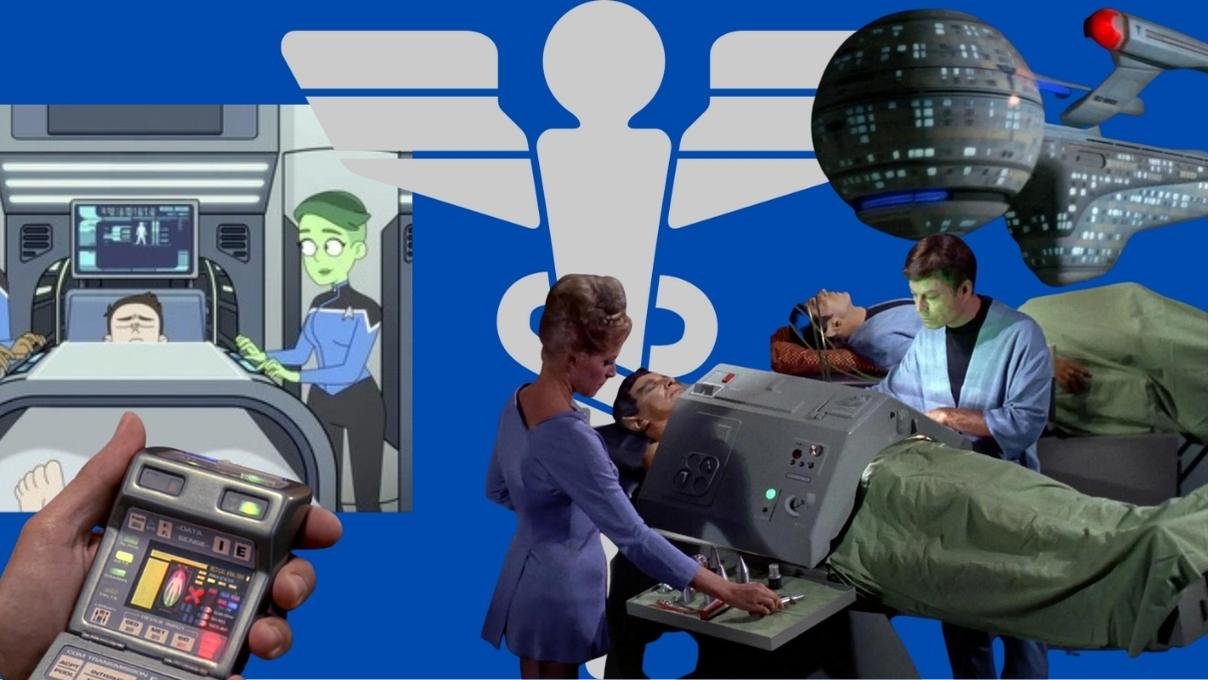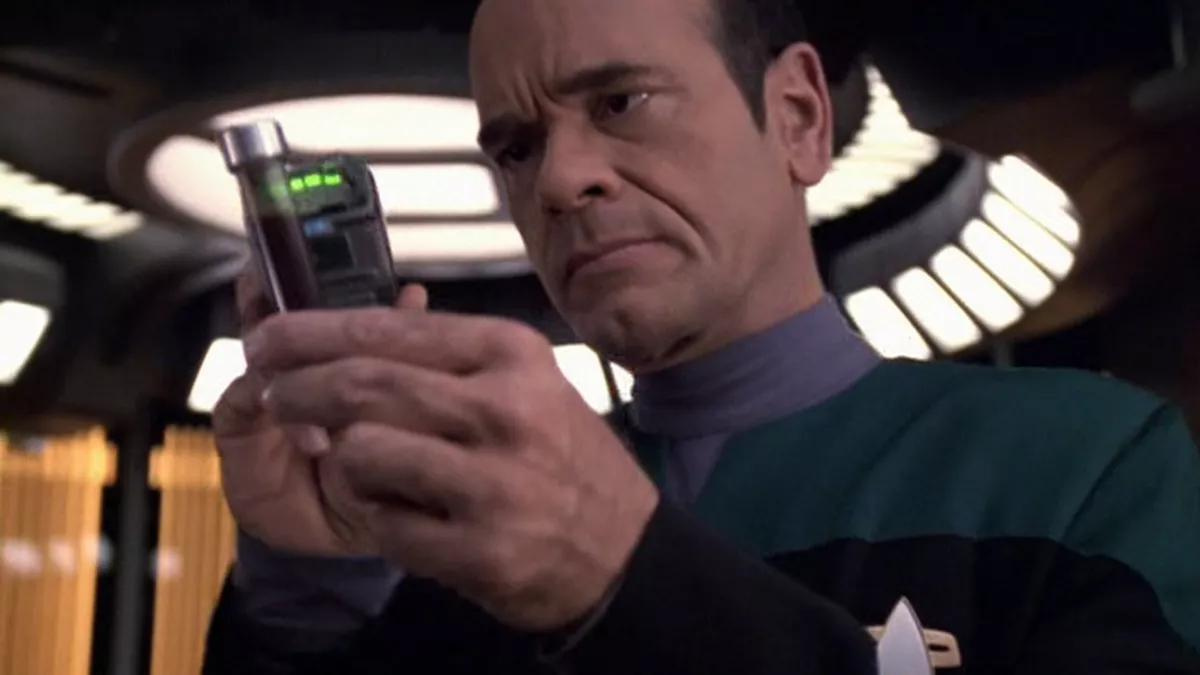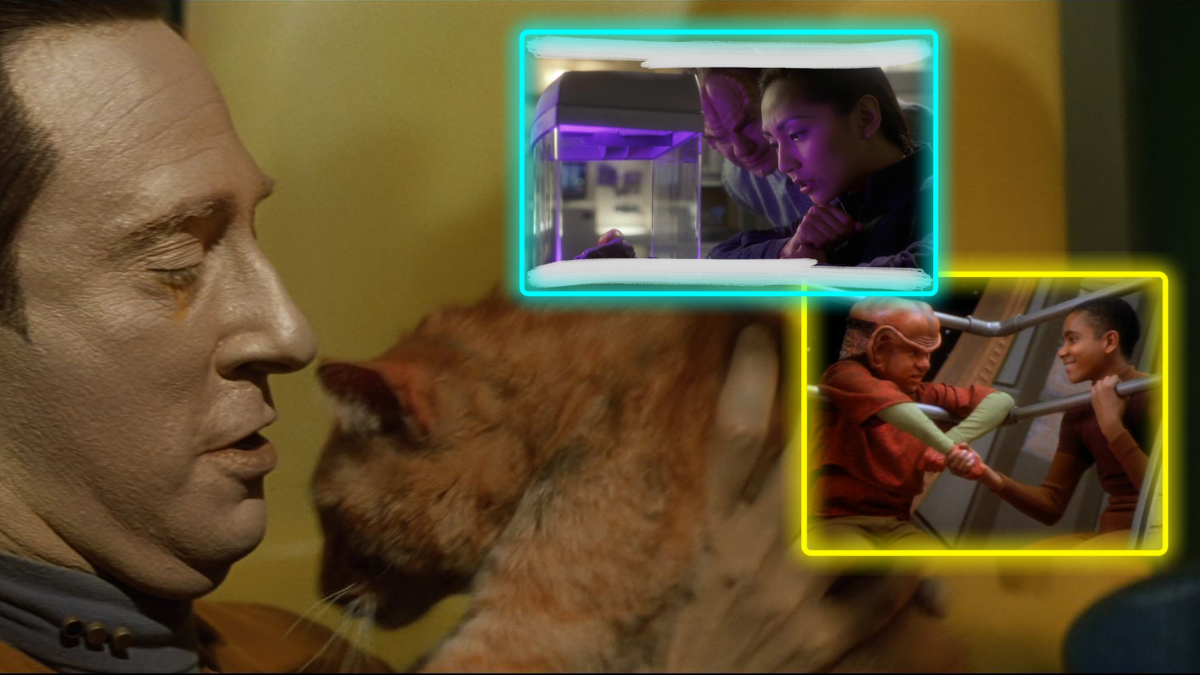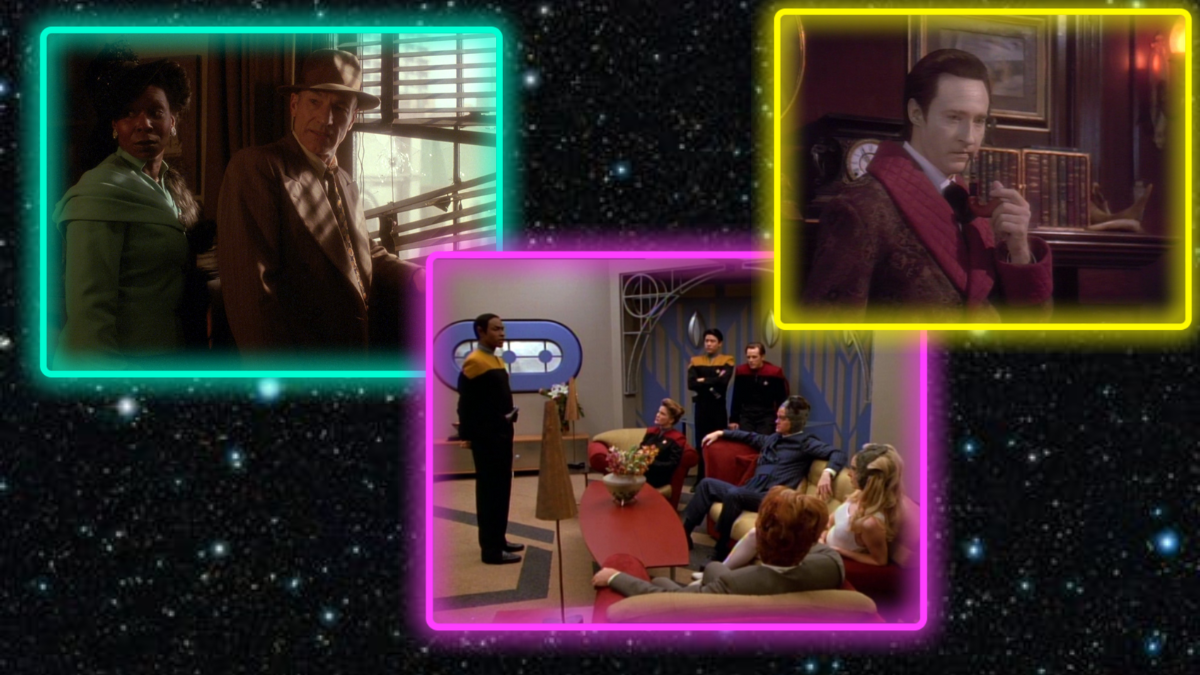T's Trek Trivia Tuesday: "What's Up, Doc?"

A variety of medical ships, devices and procedures populate the Star Trek universe
When there’s a medical emergency aboard Deep Space Nine, you don’t consult Dax. When a DNA retrovirus rears its ugly head in a member of your crew, your first call isn’t to Worf. When the only Vulcan aboard your starship is diagnosed with Pa’nar Syndrome, you don’t cry, “Scientist, heal thyself!” Of course not. You call the doctor.
The Chief Medical Officer (CMO) of a starship or space station is an incredible asset. They may not always have the bedside manner one would want from an HMO or PPO, but they know how to develop the antidote for the virus that makes you want to take over the ship and they can create holographic lungs to replace the ones that were stolen from you. Where do they come from, these heroes of the fleet? Read on to test your knowledge of our favorite doctors’ backgrounds. But beware. In the article that follows are SPOILERS for Star Trek: Discovery (DIS) and Star Trek: Lower Decks (LDS). You’ve been warned!
Doctor Leonard H. “Bones” McCoy, the CMO aboard the USS Enterprise NCC-1701, dealt with all kinds of strange illnesses, even contracting one himself in season 3 of The Original Series (TOS). With charm and skill, he dealt handily with medical emergencies as they arose. But every great doctor starts somewhere.
What University did McCoy attend, and who did he meet there, connecting to a later Trek series?
Deforest Kelley played Doctor Leonard H “Bones” McCoy in Star Trek: The Original Series
McCoy, an “old country doctor,” matriculated at Earth’s University of Mississippi. While there, he met a Trill who was visiting Earth, Emony Dax. Emony was the third Dax symbiont, on Earth at the time to judge a gymnastics competition. She and “Bones” had a brief romance before she left.
A century later, Dax’s eighth host, Jadzia, looked back fondly on that time as she watched McCoy from afar while on a mission to set time right.
Doctor Beverly Crusher served on another Enterprise, a generation after McCoy. During her first year of service under Captan Picard, she and the good captain found themselves trapped together in an underground cavern on the planet Minos. Worse, Crusher was nearly buried in sand and rocks. Suffering from severe injuries and rapidly going into shock, she had to teach Picard how to stop her from bleeding out while fighting to remain conscious.
What was her medical advice and where did she learn it?
Gates McFadden played Doctor Beverly Crusher o Star Trek: The Next Generation
Beverly recognized a nearby root. Under her instruction, Picard discovered it had a bitter taste and left a yellow tint on his skin. Knowing that the root was a good clotting agent, she instructed him to spread as much of it as he could onto the leg wound.
It developed that Beverly was on Arvada III with her grandmother, Felisa Howard, when the terrible tragedy occurred. We never learn what the tragedy was, but it ended with a lot of deceased colonists. Felisa may not have been a doctor, but she knew the healing powers of roots and herbs, using that knowledge to care for the injured and unwittingly saving her granddaughter’s life years later.
Beverly Crusher took a year’s sabattical from the Enterprise to head up Starfleet Medical, leaving the ship with the gruff Doctor Katherine Pulaski. When Commander Riker’s father, Kyle, visited the ship, it became clear that he and Pulaski knew each other and were a little more than friends.
Under what circumstances did Kate and Kyle meet?
Diana Muldaur played Doctor Katherine Pulaski on Star Trek: The Next Generation
In 2353, some 13 years before she served on the Enterprise, Kyle advised Starfleet as a civilian strategist during the Tholian conflict. The starbase he was on was attacked, leaving him as the sole survivor. Doctor Pulaski nursed him back to health at a Starfleet medical facility and they fell for each other. She would have married him, too, if not for the priority he placed on his career.
Doctor Julian Bashir took his place as CMO of Deep Space Nine after the Cardassian withdrawal from Bajor. Brilliant but brash, the young doctor suffered from an inflated ego which, while possibly justified, rubbed some of his co-workers the wrong way. But Julian wasn’t always a wunderkind.
What did his parents do during Julian’s childhood to ensure his bright future?
Alexander Siddig played Doctor Julian Bashir on Star Trek: Deep Space Nine
Julian was born with serious learning disabilities and performed poorly in school. When he was six years old, his parents, Richard and Amsha, bundled him off to the planet Adigeon Prime. There he underwent a genetic resequencing procedure illegal under Federation law.
Bashir’s intellectual and physical abilities were greatly enhanced by the procedure, but it left his emotional health impaired. It took some time for him to get over his feelings of being an artificial replacement for a defective child.
The Emergency Medical Hologram (EMH) was never meant to be a permanent replacement for a starship’s CMO. Unfortunately, when the USS Voyager was unceremoniously flung into the Delta Quadrant, anyone qualified to fill that position was killed and The Doctor had to be left on for seven years. In that time, he gained a bedside manner, a love of opera and autonomy to leave the ship’s sickbay. Most of his life was spent on Voyager, but it didn’t begin there.
Where was The Doctor designed and by whom?
Robert Picardo played The Doctor on Star Trek: Voyager
The EMH prototype was designed and developed in the holoprogramming center at Jupiter Station by Dr. Lewis Zimmerman. Zimmerman modeled the appearance of the EMH after himself. No narsicism there. Reginald Barclay, formerly of the starship Enterprise, was part of Zimmerman’s team, charged with testing the EMH’s intepersonal skills. You could view this as appropriate, ironic, or just a sick joke, considering the first time we met Barclay he was suffering from holodiction.
A century before McCoy was doctoring, a Denobulan named Phlox was using his osmotic eel to cauterize wounds on the USS Enterprise NX-01. Phlox had several children, the youngest of which, a son named Mettus, had been estranged from his father for decades.
Do you remember what caused this rift?
John Billingsley played Doctor Phlox on Star Trek: Enterprise
The Denobulans and Antarans had fought each other in a number of wars throughout the centuries, with many casualties on both sides. Because of this, a hatred, born of fear, grew between the two races. This prejudice led each race to demonize the other.
When he was a child, Phlox’s grandmother wouldn’t let him visit a planet on which the Antarans once lived. When he became a parent, the physician was determined not to pass on such prejudices to his children. Mettus, however, rejected his father’s values, choosing instead to continue the cycle of hate for Antarans.
We met Doctor Hugh Culber when he was serving aboard the USS Discovery in the 23rd century. A lot has happened to him and his shipmates since then: he’s died, come back, travelled to the 32nd century and taken on the role of CMO and ship’s counselor. But let’s go back to the beginning.
What made Culber decide to go into medicine?
Wilson Cruz plays Doctor Hugh Culber on Star Trek: Discovery
When he was 16 years old, Culber went on a hike on the cliffs of Cabo Rojo, on Earth. He fell and was rescued by Doctor Kashkooli. Kashkooli’s skill at stitching and closing Hugh’s shoulder wound inspired him to pursue the medical profession. The incident left behind a scar, which Culber’s husband, Paul Stamets, found “very sexy,” but after the doctor’s resurrection, the scar was gone.
There’s precious little information so far on the USS Cerritos’ CMO, Doctor T’Ana, so let’s talk instead about Ensign D’Vana Tendi, the junior officer assigned to sickbay in Star Trek: Lower Decks (LDS). Being an Orion, Tendi has had to deal with setbacks and stereotypes related to her race. While stereotypes are offensive, in the episode “We’ll Always Have Tom Paris” Beckett Mariner learned something about Tendi’s past that might back up a suspicious person’s caution of her.
What was Tendi up to before she joined Starfleet?
Noël Wells voices ensign D’Vana Tendi on Star Trek: Lower Decks, with Ensign Bradward Boimler (Jack Quaid) looking on
When Mariner accompanied Tendi on a mission for Doctor T’Ana, the young women found themselves undercover in an Orion Pirate Outpost. There, Mariner learned that in an earlier part of her life, Tendi had been an Orion pirate, bearing the title Mistress of the Winter Constellations. This was a side of Tendi we, as an audience, and Mariner, as her co-worker, had never seen. Embarrassed by her past, Tendi joined Starfleet in order to escape it, earning the disdain of the Orion people.
T is the Managing Editor for Daily Star Trek News and a contributing writer for Sherlock Holmes Magazine and a Shakespeare nerd. He may have been the last professional Stage Manager to work with Leonard Nimoy, has worked Off-Broadway and regionally, and is the union Stage Manager for Legacy Theatre, where he is currently working with Julie Andrews. after which he’ll be working on Richard III at Elm Shakespeare Company.














